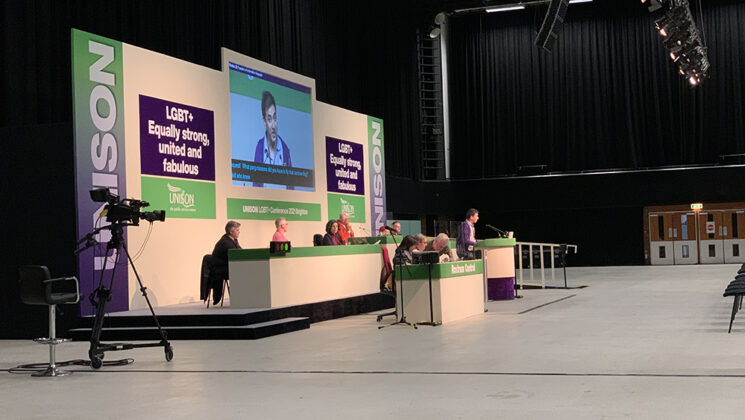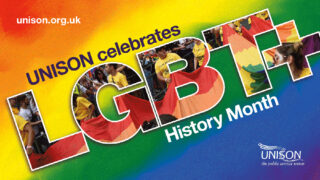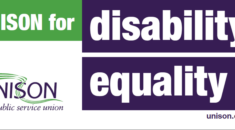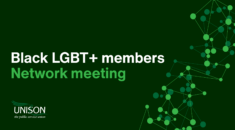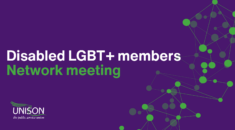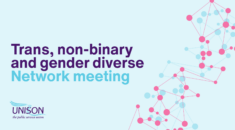UNISON’s LGBT+ conference opened in Brighton this morning, and on Transgender Day of Remembrance, at the end of Transgender Awareness Week, the first day’s business was dominated by the need to fight back against increasingly strident transphobia, including campaigns that are being funded by the far right.
Delegates first watched a video presentation from Francia Blanco, the international representative for SINTRADOTRANS, a union of transgender domestic workers in Nicaragua, who spoke about the importance of C190, the International Labour Organization’s convention on ending violence and harassment at work.
Then came the first motion of the day, with Watty Gaffney from Scotland on Supporting Stonewall and our trans community, which sought to address the deliberate (by some) misinterpretation of Stonewall guidance on trans inclusion that is seeing organisations such as the BBC withdrawn from involvement with the LGBT+ organisation.
“We didn’t get where we are today without Stonewall and trade unions working together,” he said and called on delegates to ensure they supported their “trans siblings”.
For the national LGBT+ committee, Neil Adams stressed that this was “about trans inclusion”, and said that UNISON should be urging employers to participate in the Stonewall diversity champions scheme.
Pronouns in the workplace
Moving a motion on Introducing pronouns in the workplace, John Cairns, for the NHS Glasgow Clyde and CVS branch told the hall that things had “come on leaps and bounds” to where we are today.
Nowadays, LGBT+ can generally feel safe in workplaces. Though he referred to the case of a religious “conscientious objector to transgenderism”, who went to an industrial tribunal because he refused to recognise a trans colleague. He lost. “Everyone deserves to have their chosen pronouns respected in the workplace,” conference agreed.
Helen O’Sullivan from Crymru/Wales said that, in her branch, “we’ve been part of this … working with the Welsh language service to ensure that badges and email signatures are bilingual”.
Robbie Barratt from the Eastern region spoke about how calls centres needed to be more trans friendly. “UNISON, working with trans members to” help educate people working in call centres who can misgender someone over the phone based on the pitch of voice, which can be stressful and unspetting.
For the national committee, Lucy Powell said that “mental image society indoctrination” on the basis of pitch of voice was not new, and told conference that her heavy smoking grandmother had frequently been misgendered – in the days before anyone thought about it.
Calling on delegates to support the motion, she told them: “Our trans colleagues – and 40-a-day grannies – deserve nothing less.”
Maureen le Marinel from the Lancashire police branch, notes that, not only does the union organise in many call centres, across sectors, but that it also has its own call centre, UNISON Direct.
As a member of the union’s national executive council, she also pledged to raise this with the relevant people there.
On behalf of the trans members’ caucus, Kim Brookes welcomed the “positive trans and non-binary polices” that are being introduced by some countries in Europe, but cautioned that this comes alongside regressive policies and attitudes occurring in Hungary and Poland and vigilance is needed.
Louder and prouder
Moving a motion on Trans equality – louder and prouder! for the national committee, Sophie Robinson said that, when she had come out as trans six years ago, there was “quite a long was to go, but the direction of travel was positive”.
But the needed reform of the Gender Recognition Act of 2004 has been negatively affected by the campaign of a vocal minority, with funding from some far-right groups.
It was a “campaign of radicalisation of women and girls” to equate danger to women and girls with trans rights.
“If I do something wrong, I should be punished for that,” said Ms Robinson. “I should never be judged just because of who I am.”
In a group debate, Claire Best from the North West, told delegates that UNISON has been preparing training for people to become trans allies and that it should be rolled out next year.
In the meantime, social media companies need to be “held accountable” when their platforms are used to spread “divisive agenda”.
And Kimberly Hughes from Scotland, told conference that “Organisations like the LGB Alliance” were attacking the very organisations that have campaigned for LGBT rights for decades.
For the national committee, Andy Chaffer stressed that UNISON is seen to lead on this in the trade union movement. “An attack on one of us – or any part of our community – is an attack on all of us.”
Download a translated transcript of Francia Blanco’s SINTRADOTRANS presentation here

